William Hemsworth's Blog, page 12
May 30, 2024
St. Joan of Arc
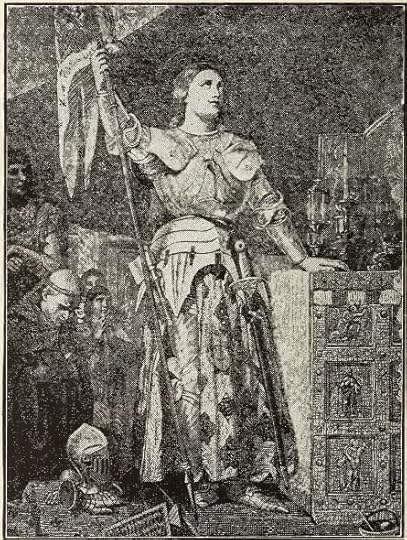
St. Joan of Arc was born in the village of Domremy in Lorraine. From her parents, who were good and honest peasants, she inherited not material riches, but a tender devotion and sincere faith, to which were united a lively trust in the patronage of Mary. She passed her early years in a life of […]
St. Joan of Arc
May 29, 2024
Reviving Resilience: Self-Care Strategies for Parents of
Special Needs Children
Caring for a child with special needs can be both rewarding and challenging. Parents often find
themselves overwhelmed with responsibilities and emotions, making self-care crucial for
maintaining their health and well-being. Today, Leslie Campos outlines several practical
tips and strategies designed to help parents better manage stress and fatigue while meeting the
needs of their families.
Faith can be a significant source of comfort and strength for parents feeling overwhelmed by the
demands of parenthood. It provides a sense of community and support, offering a network of
like-minded individuals who can offer practical help and emotional encouragement. Additionally,
spiritual practices like prayer or meditation can promote a sense of peace and perspective,
helping parents manage stress and regain a sense of control over their lives. This spiritual
connection can also instill hope and resilience, empowering parents to face challenges with a
more centered and positive outlook, which can have a profound impact on their overall well-
being and their ability to nurture their family.
Parents of special needs children often face numerous stressors that can lead to fatigue.
Recognizing the triggers of fatigue is the first step in creating an effective self-care plan. Self-
awareness is crucial; whether it’s sleep deprivation, emotional stress, or the physical toll of
caregiving, knowing what drains you allows for targeted interventions.
Understand Your Limits
Understanding your limits is pivotal. Monitoring fatigue levels isn’t just about acknowledging
you’re tired; Verywell Health notes that it’s about taking proactive steps to manage it. Using
simple tracking methods like a fatigue diary can provide insights into your patterns. Once
identified, measures such as short naps or task delegation can be employed to combat fatigue.
Look Into Flexible Work
Work-life balance is critical for parents juggling caregiving and professional responsibilities.
Flexible work hours or remote work options may provide the respite needed to balance both.
Employers are increasingly open to such accommodations, especially if it means retaining
valuable staff members.
Pursue Personal Growth Through Continued Education
Pursuing personal growth is a journey that often involves continuous learning and skill
development. One of the most effective methods to establish a solid career foundation is
through higher education. In today’s digital age, achieving advanced qualifications, like a
master’s degree in nursing, has become more accessible and flexible with online education.
Also, by gaining an MSN degree online, you can pursue more advanced clinical roles, take on
leadership positions in healthcare settings, engage in specialized practice areas, or contribute to
nursing education and research.
Maintain a Clutter-Free Home
A clutter-free environment can do wonders for reducing stress levels. For parents of special
needs children, keeping a clean home might seem like a monumental task, but there are
practical cleaning hacks to consider. Simple organizational tools can keep playrooms and
bedrooms tidy, offering a less chaotic and more peaceful setting.
Expand Your Professional Dreams
The pursuit of professional dreams shouldn’t be sidelined by the demanding role of being a
parent to a special needs child. Forming a business can be conducted less expensively than a
lawyer would charge through careful research and planning. Key steps include drafting a
comprehensive business plan, finding a formation service, and devising a robust marketing strategy. Achieving these milestones not only brings you closer to realizing your professional
aspirations but also provides a fulfilling counterpoint to your caregiving responsibilities.
Observe Self-Care Techniques
Effective self-care is an ongoing process that requires regular practice. Everyday Health points
out that techniques such as meditation, exercise, and engaging in hobbies that bring joy can be
part of a comprehensive self-care plan. Consistency in these activities ensures that they offer
the respite needed to face daily challenges.
Engaging in a business venture can be a powerful vehicle for personal growth and boost your
self-esteem. One crucial aspect of establishing your brand is having a well-designed logo, and
online tools now offer high-quality, free logos to help you create your identity. A unique and
memorable logo can significantly elevate your brand’s perception and market presence.
Therefore, pursuing a business while maintaining your role as a parent to a special needs child
can benefit your confidence while helping to establish your brand.
Leslie Campos is founder Wellparents.com
New Deacon Ordained in Hopes of Relieving Shortage of Catholic U.S. Navy Chaplains
PORTLAND, ME — The Reverend Mr. Erin M. Donlon, LT, USNR, a candidate for the Catholic priesthood and United States Military chaplaincy, was ordained a transitional deacon on Saturday, May 25, in his home Diocese of Portland in Maine. The new deacon is on track to be ordained a priest next year and hopes eventually to serve as a Catholic chaplain in the U.S. Navy, providing pastoral care to Catholic sailors and their families with endorsement and faculties from the Archdiocese for the Military Services, USA (AMS).
The Rev. Mr. Donlon celebrated his diaconal ordination at the Cathedral of the Immaculate Conception through the laying of hands and the prayer of consecration invoking the Holy Spirit by Bishop James T. Ruggieri. AMS Auxiliary Bishop Joseph L. Coffey concelebrated the 10:00 a.m. ordination Mass.
Among those in attendance were the new deacon’s parents, retired U.S. Navy Commander Michael and Mrs. Rebecca Donlon, and siblings Meghan Donlon, Ryan Donlon, LT, USN, Sarah Donlon, Katie Scholl, Emily Donlon, and Kieran Donlon.
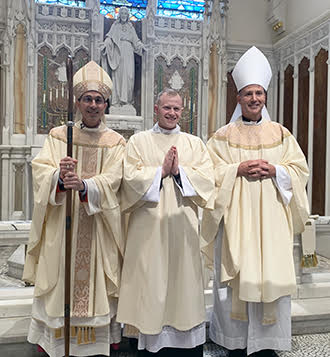
The Rev. Mr. Donlon, 30, who was home-schooled in his early years, holds a Bachelor of Science (BS) Degree in Marine Systems Engineering from the Maine Maritime Academy in Castine, ME. He is now pursuing a Master of Divinity (MDiv) and a Bachelor of Sacred Theology (S.T.B.) from Mount St. Mary’s Seminary in Emmitsburg, MD, where he is in priestly formation. Upon presbyteral ordination next year he will invest three years in the Portland Diocese, gaining pastoral experience before acceding to active duty under his Co-sponsored Seminarian Agreement with that diocese and the AMS.
The Rev. Mr. Donlon says he’s always dreamed of being a priest. “I remember from a young age that I had expressed a desire to be priest,” he says. “I was heavily inspired by the great examples of the priests that I was exposed to in my home parish.” In 2017 he followed in the footsteps of his retired father, joining the Navy Reserve as a commissioned Strategic Sealift Officer before entering the Navy’s Chaplain Candidate Program in 2020. He says, “It was after an assignment at Yokosuka Navy Base in Japan where I witnessed the great fervor of the faithful serving our country and the great struggle to receive the sacraments because of the lack of priests serving in the Navy.”
Indeed, the eventual service of the Rev. Mr. Donlon and other Catholic chaplain candidates is greatly anticipated by the Navy, which, like all other branches of the U.S. Military, continues to suffer a chronic Catholic chaplain shortage. Currently, the Navy has only 46 priests on active duty, serving a Catholic population of more than 85,000 Sailors, Marines, Coast Guardsmen, and their families, spread worldwide.
Young men interested in discerning a priestly vocation, and the vocation within a vocation to serve those who serve in the U.S. military, can find more information at www.milarch.org/vocations, or may contact AMS Vocations Director Father Marcel Taillon by at vocations@milarch.org or (202) 719-3600.
May 28, 2024
Path to priesthood for three men shaped by love for Eucharist, service
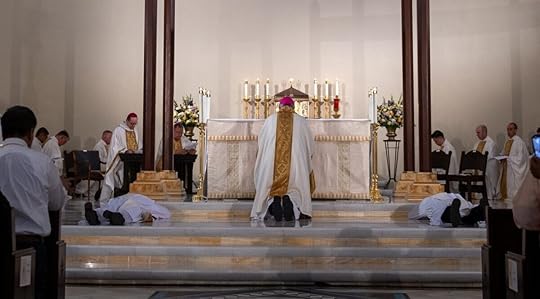
It’s been a winding road, at times even international in scope. On June 1, transitional Deacons Elijah Delello, Jesús Martinez and Joseph Nguyen will be ordained to the priesthood by Bishop John P. Dolan of the Diocese of Phoenix. Configured to Christ, each of the three young men has had a unique path to priesthood.…
Path to priesthood for three men shaped by love for Eucharist, service
May 26, 2024
Homily: Feast of the Holy Trinity
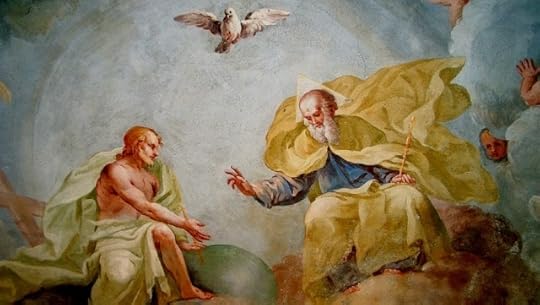
Fr Eugene Lobo SJ – Sunday May 26, 2024 Deuteronomy 4:32-34, 39-40; Romans 8:14-17; Matthew 28:16-20 On the feast of the Most Holy Trinity the church invites us to reflect on the central and most unfathomable mystery of that faith, which she has been sent to announce and make present: the mystery of who God…
Homily: Feast of the Holy Trinity
May 25, 2024
On Trinity Sunday, May We Contemplate God’s Love and Mercy
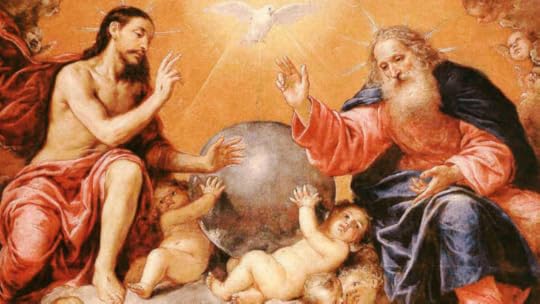
The feast of the Most Holy Trinity is providential in more ways than one. The statement I am about to make about it might sound outlandish and preposterous: this feast is providential because a good number of believers tend to reduce God to a manageable size which would make our brand of religiosity convenient and […]
On Trinity Sunday, May We Contemplate God’s Love and Mercy
May 24, 2024
Hundreds Brave Rain to Attend 30th Annual Memorial Mass at Basilica
WASHINGTON, DC — Hundreds of Catholic U.S. Military members, war veterans, and others braved damp weather and slick streets on Saturday, commuting to the Basilica of the National Shrine of the Immaculate Conception for the 30th Annual Memorial Mass. His Excellency, the Most Reverend Timothy P. Broglio, J.C.D., Archbishop for the Military Services, celebrated the Memorial Mass, as he does each May, to honor the men and women who have served in the United States Armed Forces, living and deceased. EWTN recorded the sacred liturgy and will broadcast the Mass in its entirety on Memorial Day, May 27, at 11:00 a.m. EDT.
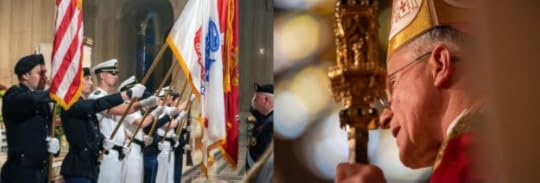
Colorful uniforms and flags splashed the nave of the Great Upper Church with bright shades of red, white, blue, green, and gold as senior active-duty and retired officers, midshipmen, members of the Military Council of Catholic Women (MCCW), friends, and family, including Gold Star Mothers, lined the pews for the 4:30 p.m. Mass. Singing over a thundering organ the Choir of the Basilica led the Congregation in the opening processional hymn, Veni, Creator Spiritus, as the celebrants made their way up the center aisle behind a Knights of Columbus color corps. Upon reaching the sanctuary Archbishop Broglio incensed the altar, a color guard of ROTC cadets from The Catholic University of America posted the colors, and all raised their voices in the National Anthem.
Preaching the homily, Archbishop Broglio implored the faithful to pray for an end to war “in Ukraine, in the Holy Land, in Africa, Haiti, and elsewhere.” He said, “Like the abundant incense we use, let our intense prayers for peace and an end to suffering rise to the Throne of Grace. May the Lord God hear and answer us.”
His Excellency reminded those gathered of the purpose for the special Mass:
“Indeed we gather together on this Vigil of Pentecost, because we want to pray for those who have given time, talents, and even their lives in order to defend this country. The U.S. military has a proud history and has repeatedly paid the price to defend our Constitution, to further liberty, to fight aggression, to feed and shelter the needy, and to protect the downtrodden. This evening we pray in a special way for all of those who have completed their earthly journey and we beg Almighty God to be merciful to them and invite them into the fullness of life.
“We also pray for and honor those left behind. Gold Star families, spouses, and others who suffered a loss. While death is the threshold to life without end, it still leaves us orphans or deprives us of the companionship of a spouse, brother, sister, or friend. In Christian fellowship at this perfect prayer we also want to offer sympathy and comfort to those who mourn.
“So also in recognizing sacrifice for good, we hold up to the healing Lord those who still pay the price of their service in bodies racked by pain or limited in movement or in mind and spirit still weakened by depression, fatigue, the effects of trauma or the memories of shattering experiences. In our prayer and outreach we want to remind them that they are not alone, but rather a part of this large family of faith.”
Starting around 90 minutes before Mass, priests heard confessions, some of the congregants prayed the Rosary, and the choir, under the direction of Dr. Peter Latona, performed a choral prelude. Mass ended with the sounding of Taps in solemn memory of those who gave their all in defense of liberty.
Newly Refreshed Symbolon: The Faith of the Church Showcases Vibrance of Catholic Faith on American Soil
Denver, CO, May 20, 2024—The Augustine Institute, home of the premier Catholic streaming service Formed, will soon release a new version of its flagship catechetical series Symbolon, taking viewers on a journey around the United States for a unique experience of the universal Church. With its sixteen visually vibrant episodes teaching the Catholic faith line by line using the Creed, Symbolon: The Faith of the Church will launch on Formed on July 17.
“Symbolon has been an incredible resource for parishes and individuals around the country and the world to teach the foundational truths of the faith for over a decade now. We believe it was time to revitalize the series with new locations, teaching methods, and storytelling that continues to hand on the ancient faith of the Church in new and exciting ways,” said Taylor Kemp, host of Symbolon: The Faith of the Church and vice president of content at the Augustine Institute. “The faith is alive and calls out to every generation. We hope to make that call clearer for those who encounter this new series and that they join us for the journey.”
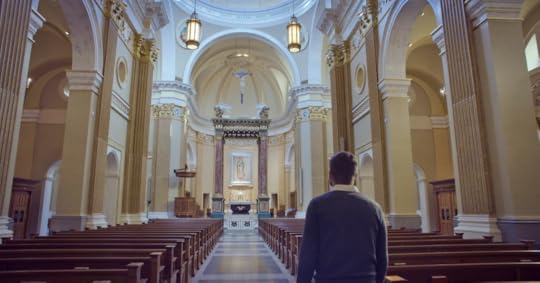
Symbolon has fostered meaningful encounters with the Catholic faith for more than a decade, widely used for OCIA programs, catechist formation, and men’s and women’s groups. Through rich cinematography, faithful storytelling, and helpful study materials, Symbolon systematically teaches the core beliefs of Catholicism using prayer, Scripture, history, and tradition.
With the same dynamic style as its beloved predecessor, Symbolon: The Faith of the Church includes new locations, including Philadelphia’s National Shrine of St. John Neumann, Oklahoma City’s Shrine of Blessed Stanley Rother, St. Augustine’s National Shrine of Our Lady of La Leche, and many others. Every episode concludes with lectio divina led either by Dr. Tim Gray, president of the Augustine Institute and well-known speaker and author, or Dr. Elizabeth Klein, associate professor of theology at the Augustine Institute. This practice grounds all the teachings in prayer, where the faithful live out their “vital and personal relationship with the living and true God” (CCC 2558).
“We are an educational apostolate and bring the strength of the Augustine Institute faculty into this series to hand on the faith in its full integrity and depth,” Kemp said. “We believe Symbolon will be an abiding program for the Church that helps viewers discover that the glory of the Catholic Church is closer than they think!”
Kemp is a Catholic convert and former professional soccer player whose love of the Catholic faith brought him to the Augustine Institute, first as a student and now employee. He co-hosts Symbolon alongside Noelle Garcia, a Catholic recording artist, speaker, wife, and mother of five children whose message has captured audiences for over 10 years.
Each of the sixteen 30-minute episodes is divided into short, digestible segments to facilitate increased discussion between catechists and participants, as well as optimize learning. Participant guides, leader’s resources, and other supplemental materials are available for purchase.
Symbolon: The Faith of the Church is available for streaming beginning July 17 on the Formed website and app alongside the other high-quality Catholic content subscribers have come to trust since 2015.
May 12, 2024
Cardinal Tagle’s reflection for the Ascension of the Lord Year B
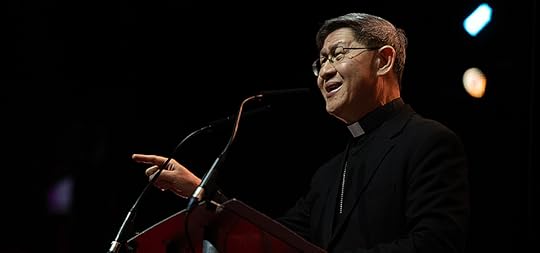
Cardinal Luis Antonio G. Tagle, Cardinal Prefect of the Congregation for the Evangelization of Peoples, has provided the following reflection for the Solemnity of the Ascension of the Lord, Year B
Cardinal Tagle’s reflection for the Ascension of the Lord Year B
May 11, 2024
Martin Luther’s Father: The Catalyst for the Protestant Reformation
The Protestant Reformation, a seismic event in the history of Western Christianity, was spearheaded by Martin Luther, whose actions and writings irreversibly transformed the religious landscape of Europe. Central to understanding Luther’s revolutionary ideas is an examination of his personal life, particularly his complex relationship with his father, Hans Luther. This relationship, marked by tension and high expectation, profoundly influenced Martin Luther’s theological convictions and his subsequent defiance against ecclesiastical authority. While it is widely recognized that Luther’s 95 Theses were a response to doctrinal grievances like the sale of indulgences, the deeper emotional undercurrents stemming from paternal pressures often remain underexplored. Yet these personal dynamics are crucial for grasping why Luther was so passionately committed to reforming the church. This article argues that Martin Luther’s strained relationship with his father not only shaped his approach to authority but also fueled his fervent pursuit of religious reform, culminating in the momentous events that led to the establishment of Protestantism.
Building on the insights about Luther’s personal motivations, it is crucial to understand how his contentious relationship with his father, Hans Luther, not only shaped his confrontation with ecclesiastical authorities but also redefined his spiritual outlook. According to Spierling (2008), the Reformation period notably emphasized reshaping familial and authority structures within society—a reflection observable in Martin Luther’s life as he navigated the complexities of paternal expectation and religious obedience. Hans Luther’s harshness and rigorous expectations might have instilled in Martin a profound sense of duty and accountability, traits that later translated into a relentless quest for doctrinal purity within the church. This dynamic played a critical role as Luther grew increasingly disillusioned with the Church’s corruption, perceiving it as betraying its holy mandate much like he felt betrayed by paternal shortcomings. His theological breakthrough—that salvation comes through faith alone—can be seen as a direct challenge to both an earthly father who failed him and a heavenly doctrine that seemed similarly conditional and punitive. As Spierling suggests, this reflects broader patterns where personal relationships profoundly informed the theological positions taken by reformers during this era. Thus, Martin Luther’s rebellion against ecclesiastical authority was not just doctrinal defiance but also an emancipation from parental disappointment, driving him towards actions that would forever alter the course of Western Christianity.
Building on this notion of personal rebellion shaping theological discourse, it is clear that the impact of Luther’s familial conflicts extended beyond personal grievances and into broader ecclesiastical debates that marked the Protestant Reformation. His strained relationship with his father, Hans Luther, profoundly influenced his view on authority—questioning its legitimacy and demanding reform when it seemed corrupt or morally bankrupt. This critical perspective toward paternal and ecclesiastical authority catalyzed his actions against the Catholic Church, leading to initiatives such as the Ninety-Five Theses. The theses explicitly challenged the Church’s practice of selling indulgences, a critique that can be indirectly linked to his disillusionment with authoritative figures who abused their power for personal gain—a trait he might have resented in his own father (PA VI – 2008). Luther’s theological insights and subsequent actions did not merely arise in a vacuum but were deeply entwined with his tumultuous paternal relationship, highlighting how personal experiences can ignite significant social and religious transformations. Thus, through analyzing Martin Luther’s life and works within this context, one can see how deeply personal motivations intertwined with broader movements, ultimately contributing significantly to reshaping European political and social landscapes during the 16th century.
The intricate connections between Martin Luther’s personal experiences and the theological stances he adopted are further underscored by contrasting his views with those of previous religious figures. As outlined in Marshall (2002), the pre-Reformation religious landscape was characterized by a lack of distinction in theological perspectives among clerics, which starkly contrasts with Luther’s critical approach to ecclesiastical authority—a perspective likely honed from his fraught paternal relations. This shift underlines how Luther’s contentious relationship with his father not only fueled his defiance against church practices but also positioned him uniquely against traditional scholastic views, which tended to align closely with established ecclesiastical power structures (“P Marshall – The Journal of Ecclesiastical History, 2002”). By challenging these entrenched doctrines—such as the efficacy of indulgences and the nature of penance—Luther was also symbolically rejecting the paternalistic control that had dominated his upbringing and early spiritual education. This personal rebellion thus became a public crusade, reshaping doctrinal discussions in ways that would have profound implications on the Reformation’s progression and the eventual fragmentation of Christian Europe into different denominations driven by similarly individualistic interpretations of scripture.
In light of Martin Luther’s pronounced critique of ecclesiastical authority and its reflection on his paternal conflicts, it becomes increasingly clear that his theological assertions were not only products of intellectual dissent but also deep-seated personal turmoil. Allison and Castaldo (2016) emphasize that Luther’s push for the Reformation was significantly anchored in the notion of Scripture as God’s supreme authority, a perspective likely fortified by his contentious relationship with his father, which undermined any human authority that claimed unconditional obedience. This doctrine starkly countered the Church’s hierarchical structure reminiscent of his father’s authoritarian stance, asserting instead a direct relationship with God free from intermediary corruption or exploitation. Such parallels underscore how Luther’s religious convictions were entangled with a personal quest for spiritual authenticity against the backdrop of perceived paternal and ecclesiastical failings. This dual confrontation enabled him to challenge prevailing church practices with such vigor and authenticity, attracting widespread support that galvanized the movement into what would become the Protestant Reformation. Thus, examining Luther through this lens reveals how deeply individual experiences can shape monumental historical events, echoing throughout religious and societal paradigms across Europe (“G Allison, CA Castaldo – 2016 – books.google.com”).
Expanding further on how Martin Luther’s strained paternal relationship influenced his theological breakthroughs, it becomes evident that this dynamic deeply affected his perception of church rituals and doctrines. Halvorson (2011) highlights that Luther’s revolutionary ideas during the early years of the Protestant Reformation significantly altered the religious landscape, particularly in how communities engaged with traditional practices. This remodeling was not just a doctrinal shift but a direct challenge to the authoritative structures similar to those he resisted in his personal life, especially those represented by his father (Halvorson, 2011). The fact that Luther pushed for more drastic changes in regions predominantly aligned with hierarchical ecclesiastical authority mirrors his own internal conflicts with authoritative figures—a reflection of his tumultuous relationship with Hans Luther. Thus, through analyzing Luther’s reforms within this framework, one observes a pattern where personal grievances catalyze broader ideological shifts; in essence, Luther’s dissent against his father can be seen as a microcosm of his larger rebellion against the Church itself. Through such an analytical lens, it becomes clear how pivotal personal experiences are not merely side notes but central elements shaping historical trajectories and reformative movements across societies.
Continuing from the earlier discussion on Martin Luther’s strained relationship with his father and its significant influence on his theological innovations, it is crucial to consider how this personal conflict paralleled and perhaps even precipitated his public dissent against church authority. According to Daley (2009), the discord between traditional ecclesiastical practices and emerging Protestant views during Luther’s time was intensified by a renewed interest in patristic studies, which sought to realign current doctrines with the early church teachings perceived as purer and more authentic. This scholarly pursuit reflected Luther’s own quest for an unmediated, direct engagement with divine truths, unsullied by human construction or intervention—echoes of his drive to break away from the oppressive paternal oversight that characterized his youth (“BE Daley – The Cambridge Companion to John Henry Newman, 2009”). In this light, Luther’s doctrinal challenges can be seen not just as theological disputes but as a broader endeavor to reclaim spiritual agency from authoritative figures in both his personal life and religious practice. His father’s authoritarian approach likely instilled in him a profound skepticism of any human authority that positioned itself as divinely sanctioned without substantive, scriptural validation. Thus, the evolution of Luther’s thoughts and subsequent actions reveal a complex tapestry of personal vendetta intertwined with genuine spiritual enlightenment, illustrating how deeply personal grievances can motivate transformative historical movements.
Building on this understanding of the personal dimensions influencing Luther’s theological dissent, it is illuminative to examine how his relationship with his father, Hans Luther, uniquely configured his perceptions of divine authority and fueled his reformative endeavors. K Johnson (2012) in the Southern Baptist Journal of Theology discusses how Martin Luther’s theological contemplations are conspicuously reflective of a broader patristic discourse evident during both the Reformation and Counter-Reformation eras. Specifically, Johnson elucidates on how patristic dialogues often underscored a strained Father/Son relationship within biblical narratives, particularly in the Gospel of John, resonating strongly with Luther’s own paternal experiences (“K Johnson – Southern Baptist Journal of Theology, 2012”). This parallel between earthly father-son conflicts and divine narratives provided a potent framework through which Luther could articulate his grievances against ecclesiastical authorities that mirrored the authoritarian traits he despised in his father. Thus, by challenging such authority figures symbolically represented in both familial and ecclesial structures, Luther was not only critiquing a religious system but also engaging in a deeper psychological rebellion against paternal dominance. This alignment of personal history with theological critique allowed him to present an authentic challenge to Church doctrines, promoting a reformation movement deeply rooted in the pursuit of spiritual authenticity free from human corruption.
Furthering this analysis, Martin Luther’s theological challenges were not merely a rebellion against ecclesiastical structures but also an existential struggle for personal and communal reformation, deeply influenced by his difficult relationship with his father. This complex dynamic is essential to understanding the broader religious reform that Luther spearheaded. As suggested by S Jambrek (2017), the Reformation needs to be seen within the context of biblical processes of renewing faith and relationships with God, both individually and collectively. This perspective provides a useful lens through which to view Luther’s actions; his personal quest to redefine his spiritual identity was intertwined with a communal desire for doctrinal renewal (“S Jambrek – Kairos: Evangelical Journal of Theology, 2017”). Essentially, Luther’s rejection of his father’s authoritative stance may have amplified his sensitivity to any form of spiritual domination that mimicked paternal authoritarianism. By contesting the church’s authority—reminiscent of questioning his father—Luther not only sought individual spiritual liberation but also advocated for a collective emancipation from what he perceived as corrupt and overbearing ecclesiastical control. Consequently, this blending of personal resolve and theological insight catalyzed significant shifts towards establishing a more direct, unmediated approach to divine worship among believers, laying foundational beliefs that would characterize Protestantism.
This examination of Martin Luther’s life further highlights how his personal grievances profoundly influenced broader theological frameworks, particularly his views on the relationship between human authority and divine command. The intersection of Luther’s strained paternal relationship and his reformative challenges is echoed in the analysis by Braaten and Jenson (1996), who reflect on how these issues informed Protestant ecclesiologies that diverged from traditional understandings of apostolic succession. They discuss how, similar to Luther’s perspective that divine authority should not be mediated by hierarchical human institutions, early Protestant churches emphasized a direct lineage from the Divine Father without human interference (“CE Braaten, RW Jenson – 1996”). This underscores a critical component in Luther’s thinking: just as he felt compelled to rebel against an overbearing earthly father, he also resisted any church structure that mimicked such authoritarianism. Therefore, Luther’s reformatory actions can be seen as both a personal catharsis and a religious crusade to restore purity and directness in spiritual practices—championing a faith system where the dynamics are driven more directly towards God rather than filtered through potentially corrupt human hierarchies. This dual challenge to both paternal and ecclesiastical authorities not only reshaped Christian doctrine but also significantly altered the religious landscape of Europe, setting the stage for modern conceptions of individual spirituality and democratic religious practice.
This personal struggle to break away from authoritative figures in both familial and ecclesiastical realms offered a pathway for Luther to engage deeply with the concept of a ‘calling,’ which Walters describes as “a life task, a definite field in which …” (H Walters – researchgate.net). For Luther, this calling was not just a professional or spiritual undertaking; it was profoundly rooted in his conflictual relationship with his father, shaping his entire theological inquiry and actions. This connection between personal experience and vocational purpose is key to understanding why Luther pushed so vehemently against the prevailing church doctrine. His drive to reform the Church can be seen as an embodiment of striving for an authentic calling free from the oppressive shadows cast by paternal figures. By drawing parallels between his subjective experiences and broader theological principles, Luther championed a model of religious engagement that emphasized personal conviction and direct relationship with God without mediation. Such notions fundamentally challenged the existing Church’s structure and were instrumental in promoting the principles that came to define Protestantism, highlighting how individual experiences can profoundly shape collective religious identities and movements.
In conclusion, Martin Luther’s personal struggle with his father Hans plays a pivotal role in understanding the fervor and direction of his religious reformations. This essay has highlighted how Luther’s fraught relationship not only provided the emotional groundwork for his critical stance against ecclesiastical corruption but also inspired his radical theological positions, which challenged both paternal and religious authority. His pursuit to rectify what he perceived as moral failings in church leadership mirrored his own disillusionment with paternal disappointment, driving him toward a path that would ultimately fragment Western Christianity. Recognizing these personal underpinnings is crucial for a deeper appreciation of Luther’s impact on the Reformation. As we reflect on Luther’s legacy, we must also consider how individual experiences can influence broader societal shifts—prompting us to question which other historical transformations have stemmed from similarly deep-seated personal conflicts. The exploration of these intricate dynamics between personal histories and public actions invites further scholarly discussion and may reveal new interpretations of significant historical events. Thus, examining Luther through this dual lens not only enriches our understanding of the past but also shapes how we approach the historiography of religious reform moving forward.
In short, Dr. Luther had daddy issues.
References
Spierling, K. E. (2008). Father, Son, and Pious Christian. Masculinity in the Reformation Era, 83, 95.
VI, P. A. (2008). The Reformation.
Marshall, P. (2002). The Reformation world. The Journal of Ecclesiastical History, 53(1), 164.
Allison, G., & Castaldo, C. A. (2016). The unfinished reformation: What unites and divides Catholics and Protestants after 500 years. Zondervan.
Halvorson, M. J. (2011). Baptismal Ritual and the Early Reformation in Braunschweig. Archiv für Reformationsgeschichte, 102(1), 59-86.
Daley, B. E. (2009). The Church Fathers. The Cambridge Companion to John Henry Newman, 29-46.
Johnson, K. (2012). What would Augustine say to evangelicals who reject the eternal generation of the Son?. Southern Baptist Journal of Theology, 16, 26-43.
Jambrek, S. (2017). The Reformation as the Process of Establishing and Renewing the Relationship with God. Kairos: Evangelical Journal of Theology, 11(1), 103-128.
Braaten, C. E., & Jenson, R. W. (Eds.). (1996). The Catholicity of the reformation. Wm. B. Eerdmans Publishing.
Walters, H. Father Knows Best.
William Hemsworth's Blog
- William Hemsworth's profile
- 7 followers



